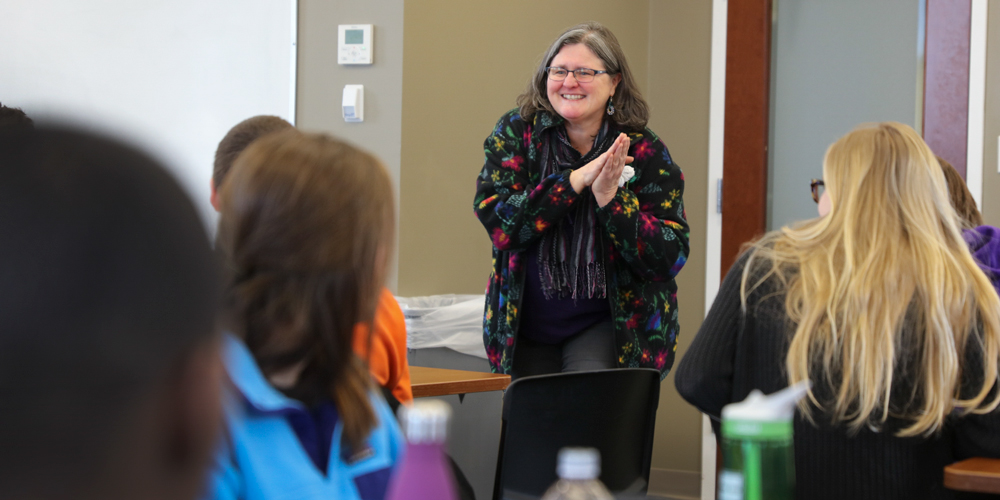
Mary Kelly: Teaching future teachers to put kids first
For Mary Kelly (MPH, 1997), educating future teachers means always putting kids at the center of any project.
As the chair of the Education Department at Hobart and William Smith Colleges in upstate New York, Mary works to ensure that future teachers understand the importance of bringing inclusive practices into their classrooms. Her goal is to ensure that all of her students' future students, including those with disabilities, will learn and thrive.
"I try to impress upon my education students how important it is for their students to experience self-determination and self-advocacy," Mary says. "It is essential to include the voices and experiences of youth and people with disabilities in making change."
Mary's own career followed a path from teaching, to a master's degree in public health, and then back to education. After her undergraduate studies, she moved to South Korea and taught English. But she had long been interested in the health and well-being of communities, so when she felt the time was right to pursue a master's degree, the community health development MPH program at UH seemed like a perfect fit.
"This program allowed me to combine my strong interest in community organization with advocacy and education," Mary says.
A particularly influential experience she had while at UH was a graduate assistantship position with the Hawaiʻi ‘Ohana Project. The project was a federally-funded initiative that worked to bring teams made up of caregivers, service providers, and school professionals together to address the needs of at-risk youth with emotional and behavioral disabilities.
"I learned a lot about what it takes to make meaningful changes in the lives of young people who face significant obstacles and challenges," Mary says.
Dr. Kathryn Braun had a profound impact on Mary's life's work. "She connected me with opportunities to work on community-based projects that had the potential to have a real impact on people's lives," Mary says. For example, in one project, Mary and two of her classmates worked with the Hawaiʻi Department of Public Health and community partners to develop a curriculum around traffic safety. That project, called Watch It, Don't Dodge It, was featured in a recent book by UH Professor Jim Skouge and Angela Zangerle, a Wai’anae resident and community leader on the project. The impact of this work was significant, and it led to Mary's interest in using technology in education, which she later focused on during her doctoral work.
"Professor Braun nurtured our learning and inspired our actions," Mary says. "I carry the lessons with me every day that I learned from my work in Hawaiʻi."
The public health program at UH is grounded in real-life advocacy for personal empowerment and a profound sense of social justice, she says.
These days, Mary teaches courses on self-determination and assistive technology, and educates future teachers about using inclusive teaching practices in the classroom. Her background in public health is instrumental to work. In the future, she wants to find ways to use new technologies to increase the ability of students to make their voices heard and determine their future paths.
"I encourage students to do work that inspires them and where they can make a difference," Mary says. "There is so much work to be done on many fronts in today's world, and public health is a strong foundation on which to build. The program at UH is a great place from which to grow."
Photo courtesy of Mary Kelly.
